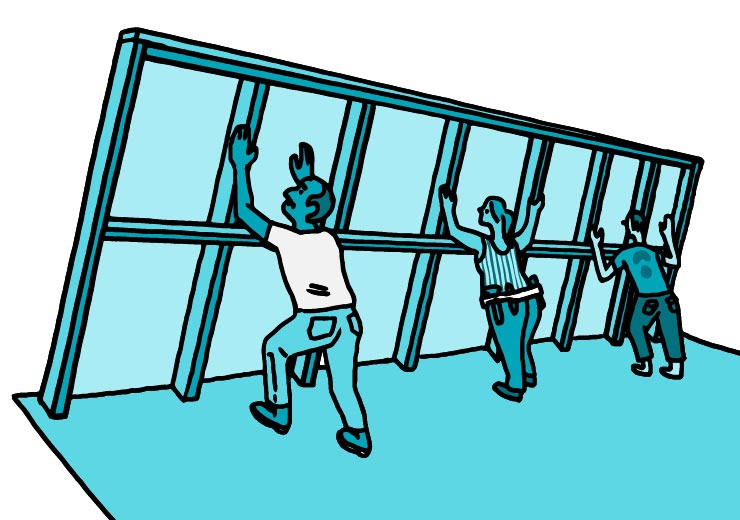Building for Equity: Project Development
Looking to secure, acquire, or improve a cultural, scientific, or historic space or place? This funding supports the planning and development of your facilities project.
Steps to Apply
1
About Building for Equity: Project Development
1
About Building for Equity: Project Development
The Building for Equity: Project Development Grants invest in the planning and development phases of a cultural facilities project. Applicants who are actively engaged with Organizational or Tribal Readiness, Project Initiation and Planning, Fundraising, and/or Early Design of a facilities project are encouraged to apply. There is $1.7 million available in the funding pool for this cycle.
These grants provide funding and technical support to help you reach your facilities-focused goals.. Awards of up to $50,000 fund a wide range of activities related to planning and development. Free access of up to 10-hours of consultant support from 4Culture’s Network of Support roster helps to address specific challenges you are facing with your facilities projects.
Federally recognized nonprofit arts, cultural, heritage, historic preservation, science and technology organizations; Tribal governments, public corporations, and public agencies; or culture or science organizations that are fiscally sponsored by a 501(c)(3) partner and provide public benefit through their programs or activities, are eligible to apply.
Foundational to this grant is King County’s Building for Equity initiative to support cultural building projects and create a pathway to racial equity and geographic access in cultural facilities funding. Building for Equity as a program provides a unique combination of funding, technical support, and strategic partnerships. This grant provides all of this if you are awarded.
If you are looking to fund acquisition, construction or renovation of a facilities project, we encourage you to check out our Building for Equity: Facilities grant. Projects that consist of general maintenance and repairs, the purchase of consumable items like light bulbs and tools, regular staff salaries, or program expenses are not eligible for this grant. We encourage you to check out our Sustained Support grants.
Public Benefit: Why It Matters
4Culture is a public agency supporting the cultural sector through revenue from Lodging Tax, 1% for Art, and Doors Open funding sources. Core to our work and defined in our Charter is a requirement that everything we fund serves the public interest, enriching communities throughout King County.
The term Providing Public Benefit means using public funds primarily to provide members of the public residing in and visiting King County access to opportunities to experience cultural resources. Public Benefit encompasses access and positive impacts for King County residents and visitors engaging with arts, culture, historic spaces, and public art across our program areas.
As you work through your application, tell us exactly how your fellow King County residents will be able to enjoy and learn from your work. Here are some ways you can provide public benefit:
- Providing the public with access to your creative work, project, or program for free or at a reduced rate.
- Providing educational programs and experiences at cultural or science organizations, Tribes, schools, or other venues accessible to the public.
- Exploring ways to expand and broaden your creative work and activities for the education and entertainment of the public.
- Participating in collaborative relationships with other cultural and science organizations, Tribes, individuals, and groups to extend the reach and impact of a project or program for the benefit of the public.
- Organizational, Tribal, or individual capacity-building projects or activities that provide meaningful public benefits not otherwise achievable.
- Providing, through technological and other means, services or programs in locations other than an organization or Tribe’s own facilities.
What’s Our Approach to Racial Equity?
With a focus on racial equity, 4Culture funds, supports, and advocates for culture to enhance the quality of life in King County. We acknowledge that systematic inequity takes many forms—racism, sexism, ableism, transphobia, heterosexism, and more. Our focus on racial equity provides us with the tools we use to dismantle all oppressions.
By centering communities that have historically faced barriers to purchasing and stewarding cultural space, Building for Equity is modeling a new facilities funding program. The goal of this program is to create pathways toward a racially equitable cultural landscape in King County.
To read more visit:
Racial Equity at 4Culture
Mission, Vision, Values
Criteria
We fund all our grants through a competitive process, carefully evaluating each application. For this particular grant, we’ll look to see how well your project shows the following for a total of 27 points:
- Quality and qualifications (5 points): the reasoning behind your proposed planning and development activities, how they relate to your organization or Tribe’s ability to meet your facilities goals, and how central your facilities goals are to your mission and the cultural programs and services your organization or Tribe provides to King County residents and visitors.
- Feasibility (5 points): your ability to complete the work described in your request with the resources and time available to your organization or Tribe.
- Impact (5 points): the impact the work described will have on your organization or Tribe’s future sustainability and ability to improve or secure its facilities. How will your community benefit from these investments.
- Advancing equity (5 points): your organization or Tribe’s focus on including historically marginalized communities, especially communities that are disproportionately impacted by structural racism, in the planning and development of this facility project. This is not a requirement for funding but will be reviewed and considered by the panel.
- Economic impact (5 points): your project, organization, and/or Tribe enhances the local economy, through staff and contractors employed, volunteer hours and in-kind donations contributed, and indirect impacts like increasing commercial activity, activating physical spaces, and enhancing the vibrancy of communities.
- Priorities (2): organizations or Tribes that are located in a Community of Opportunity or are outside of Seattle, and/or prioritize serving historically marginalized communities or audiences will be prioritized if all criteria are met.
2
Are You Eligible?
2
Are You Eligible?
Building for Equity: Project Development grants are available to King County-based, federally recognized nonprofit arts, cultural, heritage, historic preservation, science and technology organizations; Tribal governments, public corporations, and public agencies; or culture or science organizations that are fiscally sponsored by a 501(c)(3) partner organization.
To apply, your organization or Tribe must demonstrate it meets all of the eligibility requirements stated below.
Your Organization or Tribe
- Is a federally recognized nonprofit arts, cultural, heritage, historic preservation, science and technology organization; Tribal government, public corporations, and public agencies; or culture or science organizations that are fiscally sponsored by a 501(c)(3) partner and provide public benefit through their programs or activities, are eligible to apply.
- Is not a K-12 school or school district.
- Has a board of directors, a proven two-year record of providing arts, cultural, or science experiences or services.
- You can, if funded, provide a W-9 form and sign a contract that limits 4Culture’s liability.
- Your organization or Tribe has an annual operating budget of less than $3,500,000.
- Your organization or Tribe is based in and conducts a majority (51% or more) of your mission-based, public-facing activities in King County.
- Your organization or Tribe is based outside of Seattle city limits. Eligibility will be determined based on the mailing address in your account profile. This address should be consistent with what your organization uses for IRS reporting purposes. OR
- Your organization or Tribe is located in a Community of Opportunity. The Communities of Opportunity (COO) index includes a set of health and socioeconomic indicators to gauge community health and well-being.
- View this Communities of Opportunity map to determine whether your organization or Tribe is located in a COO. COO areas are outlined in purple:
-
If your organization or Tribe does not meet any of the criteria above, you may submit an Eligibility Form for consideration by the Review Panel. This form will ask how your organization or Tribe’s primary mission and services support historically underserved communities.
- If your organization or Tribe does not have a primary location, you may qualify if 51% of programming in the past two years occurred in locations that would meet the requirements above. You may submit an Eligibility Form describing the organization or Tribe’s programming and locations in the past two years.
Science and Technology-based organizations must meet these additional eligibility requirements:
- Must be a federally recognized nonprofit organization (501c3) and incorporated in the state of Washington as a Nonprofit Corporation.
- OR must be fiscally sponsored by a 501(c)(3) organization incorporated in the state of Washington and your fiscal sponsor also meets all of the Science and Technology-based organization eligibility criteria.
Science and Technology-based organizations and their fiscal sponsors may not be:
- A university, college, or institution of higher education.
- An agency of the state or any of its political subdivisions.
- A municipal corporation.
- An organization that raises money for redistribution to multiple cultural organizations.
- A radio or television broadcasting network or station, cable communications system, Internet-based communications venture or service, newspaper, or magazine.
Your Proposal
The facilities project development work you propose must directly aid you in the planning and development stage of your facility project and identify with one or more of the four milestones identified below:
Organizational or Tribal readiness: Anticipating the full impact of the project on your organization or Tribe’s ability to function and serve its mission – both during and after the project. For more information visit: Deciding on a Facility Project | Nonprofit Finance Fund
Project initiation and planning: Developing the actual project, detailing spatial needs, locations, costs, phases, schedule and feasibility. For more information visit: Pitfalls and Dangers to Avoid During Facilities Projects | Nonprofit Finance Fund, Cultural Space Handbook | BASE Chapter 26
Fundraising: Raising funds for the project or running a capital campaign which is a targeted fundraising effort that takes place over a defined period of time. For more information visit: What Is a Capital Campaign? Ultimate Guide for Nonprofits | DonorSearch
Design: Early design work before construction documents. This includes pre-design/programmatic design, schematic/conceptual design, or design development. For more information visit: Defining the architect’s basic services|AIA
Examples of fundable activities include:
- Consultant expenses for the creation of a strategic plan geared towards a capital campaign or a facilities plan. This excludes staff fees unless their work on the project is outside their regular job duties and payment is above and beyond their regular compensation structure.
- Hiring fundraising consultants or fundraising staff to expand fundraising capacity, develop a capital fundraising plan and/or conduct a feasibility study.
- Training for board, staff and volunteers in leadership development, fundraising, and/or institutional planning to prepare for a capital campaign or construction project.
- Architectural master planning, pre-design and concept design services.
- Building condition assessments, historic structure reports, or preservation plans.
- Consultant fees and other expenses for ADA-compliance facilities planning.
- Design and planning for facility modifications in response to COVID-19.
- Expenses related to community charettes, including participant stipends.
- Real estate brokerage services to identify potential properties to lease or purchase.
- Financial planning to position an organization or Tribe to secure their facility’s needs.
- Other facility-related planning that increase an organization or Tribe’s stability and resilience.
This program is focused on capacity building and does not fund annual operating expenses, full scope architectural services, rent, or construction projects. Staff expenses may only be reimbursed if they are directly related to the capacity building initiative described in you grant application. Please see our Sustained Support program for operating support. Organizations seeking funds for a capital project are encouraged to apply for a Cultural Facilities grant.
Discipline Definitions
4Culture funds organizations or Tribes and facility projects that are focused on Arts, Historic Preservation, Heritage, and Science and Technology. Below are definitions of each discipline.
- Arts: includes organizations and Tribes focused on creative place-making, cultural festivals, dance, design, film, folk and traditional arts, literary arts, multidisciplinary arts, music, theater, and visual arts.
- Heritage: includes organizations and Tribes focused on the preservation and transmission of local history; ethnic history; Native cultures; folklore and intangible cultural heritage; and historic and archaeological resources.
- Historic Preservation: includes organizations and Tribes focused on advocacy or assistance to preserve, promote, and sustain historic places; education about our historic built environment; or stewarding historic properties that serve as a venue for cultural activities.
- Science and Technology: includes organizations and fiscally sponsored Tribes focused on natural and social sciences, characterized by a formalized framework that entails the reproducible testing and revision of falsifiable ideas based on observable facts, as well as formal and applied sciences, such as mathematics and engineering. Applicants that are zoos or aquariums must also be accredited by the Association of Zoos and Aquariums.
If you’re not sure if your organization, Tribe, or project fits the organization/Tribe and project eligibility requirements or you have a question about these criteria, please contact Jayden Robles (Chumash/Cahuilla/Ohlone), Building for Equity Program Manager, at .
If Awarded
You must begin your project development work within one-year of being awarded and complete the scope within three-years.
Your organization or Tribe has free access of up to 10-hours of consultant support from 4Culture’s Network of Support roster to help you address specific challenges you are facing in your project development work.
If awarded and you need space and/or specific technical support not available through the Network of Support, you may be paired with a Cultural Space Partner from the Building for Equity: Anchoring Community program. A Cultural Space Partner provides free cultural space and/or technical support for a duration of 3-years. This partnership is arranged by 4Culture staff. If you have questions about Cultural Space Partnerships, please contact Maya Santos, Building for Equity Program Manager, at maya.santos@4culture.org.
3
Helping You Succeed
3
Helping You Succeed
 Workshops
Workshops
Workshops provide an opportunity for you to meet staff, learn about the process, ask questions, and meet other artists and arts groups. They are informal and virtual. Zoom registration required. Take advantage of this opportunity to strengthen your application!
Note: July 28 will be an Office Hours session. There will be no formal presentation but grant managers will be on hand to answer any last-minute questions ahead of the August 7 application deadline.
If you cannot attending a workshop, this recording is available for you to watch:
Substitulos en Español | 中文字幕(繁體)
Resources
Read a sample application from an awardee that successfully received funding in a previous cycle.
Visit our Building for Equity: Field Resources page for resources on building an equitable development practice, what to consider before pursuing a facilities project, how to prepare for facilities projects, manage ongoing costs of facility ownership and much more.
Dig into the Cultural Space Handbook, a compilation of top lessons learned in the process of running a cultural space from Cultural Space Agency’s BASE program.
Contact Us
We’re here to help! Please contact us if you have any questions about this program. We can provide guidance as you work through your application. We look forward to getting to know you and your efforts toward your cultural facility project! You can contact us about:
You can contact us about:
- Your organization, Tribe, and/or project eligibility status.
- Accessing the grant application.
- The panel review process, award notifications, eligible expenses, contracting, and reimbursement/payments.
- Review grant application drafts.
- Scheduling a site visit or a meeting.
4Culture has engaged facilities project development consultants who can help you frame your project in the application. All consultants have extensive experience planning and development of cultural facilities projects. Contact 4Culture staff to be connected to a consultant.
You can contact them about:
- Determining where you are and where you want to be with your facilities project.
- Approaching project brainstorming, planning, and timeline.
- Advice on scaling your project.
- Presenting your vision in the application.
- General information about best practices for project development.
This additional resource is intended to complement the information provided through 4Culture’s website, workshops, and staff. Consultants are not involved in funding decisions and will not share anything discussed in your consultation with the 4Culture team unless they need additional information to answer your questions.
Jayden Robles (Chumash/Cahuilla/Ohlone), Building for Equity Program Manager
j
206-263-2522
Maya Santos, Building for Equity Program Manager
206-263-0691
Lauren Miles, Building for Equity Support Specialist
206-263-3210
Translation and Assistance
The guidelines, a detailed explanation of how to apply, and the application are in English. If this is a barrier that stops you from understanding the grant or applying due to limited English writing ability, visual impairment, or you would like to request assistance to create an application, please contact or call (206) 296-7580 or TTY 711, and we will make sure you get the support you need.
Русский (Russian)
Руководство, подробная инструкция и форма заявки на английском языке. Если вам сложно разобраться в процедуре получения грантов или подачи заявок из-за ограниченных навыков письменного английского языка либо нарушений зрения, а также если вы бы хотели обратиться за помощью при составлении заявки, отправьте письмо на адрес электронной почты или позвоните по номеру (206) 296-7580 или 711 (телетайп), и мы позаботимся о том, чтобы вы получили необходимую помощь.
Soomaali (Somali)
Tilmaamaha, sharaxaadda faahfaahsan ee ku saabsan sida loo codsado, iyo waraaqda codsiga waxa ay dhammaan ku qoran yihiin Af-Ingiriisi. Haddii ay arrintani tahay caqabad kaa hor istaageysa fahamka deeqda ama codsashada oo ay sabab u tahay awoodda qorista Af-Ingiriisiga oo xadidan, araggaaga oo liita, ama aad jeclaan lahayd inaad codsato in lagaa caawiyo in aad codsi sameyso, fadlan la xiriir ama wac (206) 296-7580 ama TTY 711, waxaana xaqiijin doonnaa inaad hesho taageerada aad u baahan tahay.
Español (Spanish)
El programa Building for Equity: Project Development Grants (Desarrollo para la Equidad: subvenciones para el desarrollo de proyectos) invierte en las fases de planificación y desarrollo de un proyecto de instalaciones culturales. Se invita a los solicitantes que participen activamente en la organización y preparación tribal, el inicio y la planificación de proyectos, la recaudación de fondos o el diseño inicial de un proyecto de instalaciones a que envíen su solicitud. Este año, se distribuirán $1 700 000.
Las subvenciones son de distintos montos, con adjudicaciones de hasta $50 000. Ofrecen financiación y apoyo técnico para que pueda alcanzar sus objetivos en materia de instalaciones y respaldan una amplia gama de actividades relacionadas con la planificación y el desarrollo. Obtendrá acceso gratuito a un máximo de 10 horas de asesoramiento por parte de la red de asesores de 4Culture, que le brindarán ayuda para resolver los problemas específicos a los que se enfrente en sus proyectos de instalaciones.
Podrán enviar su solicitud las organizaciones sin fines de lucro reconocidas a nivel federal en los ámbitos de las artes, la cultura, el patrimonio, la conservación histórica, la ciencia y la tecnología; los gobiernos tribales, las corporaciones públicas y los organismos públicos; o las organizaciones culturales o científicas que cuenten con el patrocinio fiscal de un socio 501(c)(3) y proporcionen un beneficio público a través de sus programas o actividades.
Tiene tiempo para presentar la solicitud a través de la plataforma en línea de 4Culture hasta el 7 de agosto a las 5:00 p. m. (hora del Pacífico). ¡Estamos para ayudarle! Póngase en contacto con Jayden Robles, director del programa Building for Equity, al correo electrónico , si tiene preguntas concernientes a este programa.
Las pautas de la subvención, la explicación detallada de cómo enviar la solicitud y la solicitud de la subvención están en inglés. Si esto le impide enviar una solicitud debido a una limitación en la capacidad para escribir en inglés, si tiene una discapacidad visual o si desea recibir asistencia para crear una solicitud, escriba a jackie.mixon@4culture o llame al (206) 296-7580 o TTY 711, y nos aseguraremos de que obtenga la ayuda que necesita.
Tiếng Việt (Vietnamese)
Hướng dẫn, giải thích chi tiết về cách nộp đơn va tài liệu áp dụng tất cả đều bằng Tiếng Anh. Nếu đây là rào cản khiến quý vị không hiểu được khoản trợ cấp hoặc cách nộp đơn do khả năng viết tiếng Anh hạn chế, do quý vị bị suy giảm thị lực hoặc muốn yêu cầu hỗ trợ để tạo đơn đăng ký, làm ơn liên hệ hoặc gọi (206) 296-7580 hay TTY 711 và chúng tôi sẽ hỗ trợ những gì quý vị cần.
4
After You Submit
4
After You Submit
 Timeline
Timeline
Applications are due August 7, 2025 at 5:00 pm PDT. Most 4Culture grants take approximately three months from application deadline to when we announce funding decisions.
Selection Process
Grant proposals will be reviewed and award decisions will be made by a panel consisting of working professionals in the fields we fund, and who represent all parts of King County, sizes of organizations or Tribes, and different points of view. The panel comes together to talk about the proposals and select projects to fund.
During the panel review process, panelists may have questions about your project or application. You may be asked to schedule a 15-minute interview with the panel or provide a written or video response. You will have approximately one week from when you hear from 4Culture to either schedule an interview or provide a reply. Being asked for additional details does not mean your application is more or less likely to receive funding.
Contracts and Payment
If we select your project for funding, we will notify you after our Advisory Committees and Board give final approval for funding, and your program manager will work out a scope of service contract. Funds are distributed on a reimbursement basis based on submitted invoices and partial upfront funds are available with invoice documentation.
Final payment requests require completion of a survey responding to the milestones identified in your application. This survey will invite you to reflect on where you were when you applied, how much closer you are to your facilities goals, and what helped you get there.
Requirements and Appeals
Learn about what will be required if you are awarded a grant, and about the process for appeal of a 4Culture decision.
5
Apply
5
Apply

You will apply through our online grant portal system at apply.4culture.org. Make sure you have an active account and that your organization profile is up to date before the August 7, 2025, 5:00 pm PDT deadline. You’ll need to be able to log in to access the Building for Equity: Project Development application.
Once you’ve started your application, you can save after each step and sign out—your application will be saved as a draft that you can continue to work on up to the deadline.
Once you click “Submit,” your application is final. For support in creating your account and accessing your application, watch this step-by-step video. Please do not hesitate to contact us if you have any questions during the process
What’s in the Application
The application requires answering 10 basic questions about your organization or Tribe, its activity, the community you serve, and your facility needs focusing on where you are and where you want to be.
Demographic Information (required)
Your profile in our portal must provide demographic information for the current year for your organization or Tribe including your board/governing body and staff. We use this information to help us understand how well we are doing in our efforts to reach all communities in King County. Read our privacy policy for information about how we protect your information.


